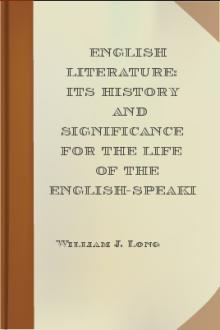English Literature: Its History and Significance for the Life of the English-Speaking World by William J. Long (good books for 8th graders txt) 📕

- Author: William J. Long
- Performer: -
Book online «English Literature: Its History and Significance for the Life of the English-Speaking World by William J. Long (good books for 8th graders txt) 📕». Author William J. Long
Illustration: GEORGE GORDON, LORD BYRON
GEORGE GORDON, LORD BYRON
In 1809 Byron, when only twenty-one years of age, started on a tour of Europe and the Orient. The poetic results of this trip were the first two cantos of Childe Harold's Pilgrimage, with their famous descriptions of romantic scenery. The work made him instantly popular, and his fame overshadowed Scott's completely. As he says himself, "I awoke one morning to find myself famous," and presently he styles himself "the grand Napoleon of the realms of rhyme." The worst element in Byron at this time was his insincerity, his continual posing as the hero of his poetry. His best works were translated, and his fame spread almost as rapidly on the Continent as in England. Even Goethe was deceived, and declared that a man so wonderful in character had never before appeared in literature, and would never appear again. Now that the tinsel has worn off, and we can judge the man and his work dispassionately, we see how easily even the critics of the age were governed by romantic impulses.
The adulation of Byron lasted only a few years in England. In 1815 he married Miss Milbanke, an English heiress, who abruptly left him a year later. With womanly reserve she kept silence; but the public was not slow to imagine plenty of reasons for the separation. This, together with the fact that men had begun to penetrate the veil of romantic secrecy with which Byron surrounded himself and found a rather brassy idol beneath, turned the tide of public opinion against him. He left England under a cloud of distrust and disappointment, in 1816, and never returned. Eight years were spent abroad, largely in Italy, where he was associated with Shelley until the latter's tragic death in 1822. His house was ever the meeting place for Revolutionists and malcontents calling themselves patriots, whom he trusted too greatly, and with whom he shared his money most generously. Curiously enough, while he trusted men too easily, he had no faith in human society or government, and wrote in 1817: "I have simplified my politics to an utter detestation of all existing governments." During his exile he finished Childe Harold, The Prisoner of Chillon, his dramas Cain and Manfred, and numerous other works, in some of which, as in Don Juan, he delighted in revenging himself upon his countrymen by holding up to ridicule all that they held most sacred.
In 1824 Byron went to Greece to give himself and a large part of his fortune to help that country in its struggle for liberty against the Turks. How far he was led by his desire for posing as a hero, and how far by a certain vigorous Viking spirit that was certainly in him, will never be known. The Greeks welcomed him and made him a leader, and for a few months he found himself in the midst of a wretched squabble of lies, selfishness, insincerity, cowardice, and intrigue, instead of the heroic struggle for liberty which he had anticipated. He died of fever, in Missolonghi, in 1824. One of his last poems, written there on his thirty-sixth birthday, a few months before he died, expresses his own view of his disappointing life:
My days are in the yellow leaf,The flowers and fruits of love are gone:
The worm, the canker, and the grief
Are mine alone.
Works of Byron. In reading Byron it is well to remember that he was a disappointed and embittered man, not only in his personal life, but also in his expectation of a general transformation of human society. As he pours out his own feelings, chiefly, in his poetry, he is the most expressive writer of his age in voicing the discontent of a multitude of Europeans who were disappointed at the failure of the French Revolution to produce an entirely new form of government and society.
Hours of IdlenessOne who wishes to understand the whole scope of Byron's genius and poetry will do well to begin with his first work, Hours of Idleness, written when he was a young man at the university. There is very little poetry in the volume, only a striking facility in rime, brightened by the devil-may-care spirit of the Cavalier poets; but as a revelation of the man himself it is remarkable. In a vain and sophomoric preface he declares that poetry is to him an idle experiment, and that this is his first and last attempt to amuse himself in that line. Curiously enough, as he starts for Greece on his last, fatal journey, he again ridicules literature, and says that the poet is a "mere babbler." It is this despising of the art which alone makes him famous that occasions our deepest disappointment. Even in his magnificent passages, in a glowing description of nature or of a Hindoo woman's exquisite love, his work is frequently marred by a wretched pun, or by some cheap buffoonery, which ruins our first splendid impression of his poetry.
Longer PoemsByron's later volumes, Manfred and Cain, the one a curious, and perhaps unconscious, parody of Faust, the other of Paradise Lost, are his two best known dramatic works. Aside from the question of their poetic value, they are interesting as voicing Byron's excessive individualism and his rebellion against society. The best known and the most readable of Byron's works Mazeppa, The Prisoner of Chillon, and Childe Harold's Pilgrimage. The first two cantos of Childe Harold (1812) are perhaps more frequently read than any other work of the same author, partly because of their melodious verse, partly because of their descriptions of places along the lines of European travel; but the last two cantos (1816-1818) written after his exile from England, have more sincerity, and are in every way better expressions of Byron's mature genius. Scattered through all his works one finds magnificent descriptions of natural scenery, and exquisite lyrics of love and despair; but they are mixed with such a deal of bombast and rhetoric, together with much that is unwholesome, that the beginner will do well to confine himself to a small volume of well-chosen selections.[227]
Byron is often compared with Scott, as having given to us Europe and the Orient, just as Scott gave us Scotland and its people; but while there is a certain resemblance in the swing and dash of the verses, the resemblance is all on the surface, and the underlying difference between the two poets is as great as that between Thackeray and Bulwer-Lytton. Scott knew his country well,--its hills and valleys which are interesting as the abode of living and lovable men and women. Byron pretended to know the secret, unwholesome side of Europe, which generally hides itself in the dark; but instead of giving us a variety of living men, he never gets away from his own unbalanced and egotistical self. All his characters, in Cain, Manfred, The Corsair, The Giaour, Childe Harold, Don Juan, are tiresome repetitions of himself,--a vain, disappointed, cynical man, who finds no good in life or love or anything. Naturally, with such a disposition, he is entirely incapable of portraying a true woman. To nature alone, especially in her magnificent moods, Byron remains faithful; and his portrayal of the night and the storm and the ocean in Childe Harold are unsurpassed in our language.
PERCY BYSSHE SHELLEY (1792-1822)
Make me thy lyre, even as the forest is:What if my leaves are falling like its own!
The tumult of thy mighty harmonies
Will take from both a deep, autumnal tone,
Sweet though in sadness. Be thou, spirit fierce,
My spirit! Be thou me, impetuous one!
Illustration: PERCY BYSSHE SHELLEY
PERCY BYSSHE SHELLEY
In this fragment, from the "Ode to the West Wind," we have a suggestion of Shelley's own spirit, as reflected in all his poetry. The very spirit of nature, which appeals to us in the wind and the cloud, the sunset and the moonrise, seems to have possessed him, at times, and made him a chosen instrument of melody. At such times he is a true poet, and his work is unrivaled. At other times, unfortunately, Shelley joins with Byron in voicing a vain rebellion against society. His poetry, like his life, divides itself into two distinct moods. In one he is the violent reformer, seeking to overthrow our present institutions and to hurry the millennium out of its slow walk into a gallop. Out of this mood come most of his longer poems, like Queen Mab, Revolt of Islam, Hellas, and The Witch of Atlas, which are somewhat violent diatribes against government, priests, marriage, religion, even God as men supposed him to be. In a different mood, which finds expression Alastor, Adonais, and his wonderful lyrics, Shelley is like a wanderer following a vague, beautiful vision, forever sad and forever unsatisfied. In the latter mood he appeals profoundly to all men who have known what it is to follow after an unattainable ideal.
Shelley's Life. There are three classes of men who see visions, and all three are represented in our literature. The first is the mere dreamer, like Blake, who stumbles through a world of reality without noticing it, and is happy in his visions. The second is the seer, the prophet, like Langland, or Wyclif, who sees a vision and quietly goes to work, in ways that men understand, to make the present world a little more like the ideal one which he sees in his vision. The third, who appears in many forms,--as visionary, enthusiast, radical, anarchist, revolutionary, call him what you will,--sees a vision and straightway begins to tear down all human institutions, which have been built up by the slow toil of centuries, simply because they seem to stand in the way of his dream. To the latter class belongs Shelley, a man perpetually at war with the present world, a martyr and exile, simply because of his inability to sympathize with men and society as they are, and because of his own mistaken judgment as to the value and purpose of a vision.
Shelley was born in Field Place, near Horsham, Sussex, in 1792. On both his father's and his mother's side he was descended from noble old families, famous in the political and literary history of England. From childhood he lived, like Blake, in a world of fancy, so real that certain imaginary dragons and headless creatures of the neighboring wood kept him and his sisters in a state of fearful expectancy. He learned rapidly, absorbed the classics as if by intuition, and, dissatisfied with ordinary processes of learning, seems to have sought, like Faustus, the acquaintance of spirits, as shown in his "Hymn to Intellectual Beauty":
While yet a boy, I sought for ghosts, and spedThrough many a listening chamber, cave and ruin,
And starlight wood, with fearful steps pursuing
Hopes of high talk with the departed dead.
Shelley's first public school, kept by a hard-headed Scotch master, with its floggings and its general brutality, seemed to him like a combination of hell and prison; and his active rebellion against existing institutions was well under way when, at twelve years of age, he entered the famous preparatory school at Eton. He was a delicate, nervous, marvelously sensitive boy, of great physical beauty; and, like Cowper, he suffered torments





Comments (0)